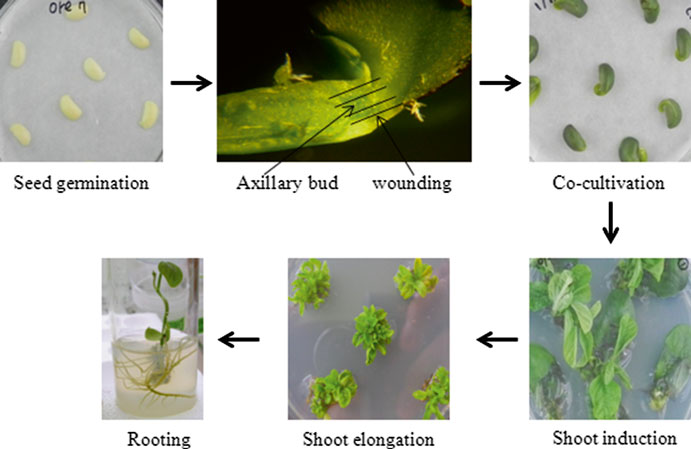Glycine max, also known as a soybean, is an annual herbaceous legume that originates from East Asia. Today, soybean has been considered as one of the most valuable crops worldwide, for both its seeds and young pods are edible, and provide important oil and protein resources for human lives. Aside from agricultural applications, soybean also serves as a model plant for the study of various physiological processes, such as nitrogen fixation, symbiosis, and so on.
Genetic transformation of soybean can be realized via either particle bombardment or Agrobacterium-mediated transformation. For microprojectile bombardment, the explants of shoot meristemsand/or embryogenic suspension cultures are commonly used, and the bombardment is usually performed by a helium-driven biolistic device (e.g., Bio-Rad PDS1000/He). For Agrobacterium-mediated transformation, wounded axillary meristem located in cotyledonary nodes are used, as it allows rapid reproduction via direct shoot organogenesis, bypassing the callus formation step (Figure 1). Immature cotyledons can also be used as explant for Agrobacterium-mediated transformation. Specifically, after cocultivation, transgenic somatic embryos can be induced directly from immature cotyledon with the adaxial side facing the selection medium, followed by maturation and regeneration of individual somatic embryos into whole plants.
 Figure 1. Scheme for genetic transformation of Glycine max cotyledonary nodes (Koh et al., 2015).
Figure 1. Scheme for genetic transformation of Glycine max cotyledonary nodes (Koh et al., 2015).
With superior expertise in plant biotechnology, as well as comprehensive collaborations with renowned research institutes and companies worldwide, Lifeasible offers tailored protocols for soybean transformation. We proudly provide a wide-ranging selection for transformation methods, explants types, Agrobacterium strains, cloning vectors with various selectable markers, as well as culture media and conditions. Our customer-centered service ensures the quality and the success of your research projects.
Reference: